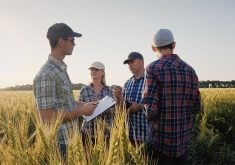Any successful farmer who owns their own operation should consider the advantages of incorporating the farm.
As a farming operation grows, so do the benefits of incorporation. The following list is not comprehensive, but it will show what incorporating can do for an operation.
Small business deduction and cash flow
Canadian tax law is designed with the theory of integration in mind. This suggests that no matter how funds are distributed, there is no preferential tax treatment. For example, a dollar earned by a farmer from the personal farming operation will be taxed the same amount as a dollar made by a corporation and then paid to its employee.
Read Also

Farmer ownership cannot be seen as a guarantee for success
It’s a powerful movement when people band together to form co-ops and credit unions, but member ownership is no guarantee of success.
While this theory technically applies to corporations, due to the small business deduction, corporations can defer most of the income tax for the individual. The small business deduction reduces corporate taxes on the first $500,000 of active business income for a corporation ($600,000 in Saskatchewan).
The owner of a corporation does not get to pay less taxes overall, but incorporation allows for control over the timing of cash flows for the tax. For example, $100 in net income to a proprietor is included on the owner’s personal tax return and taxed at their marginal rate (up to 48 percent in Alberta and Saskatchewan and 50 percent in Manitoba).
The $100 in net income for a corporation is subject to the corporate tax rate which, including the small business deduction, is as low as 11 percent in Alberta and nine percent in Saskatchewan and Manitoba.
The difference between these alternatives leaves up to 37 percent in additional funds to be put toward farming operation reinvestment or paying down debt. The ability to control cash flows has many beneficial applications, such as enabling growth by paying less tax in those earlier years when trying to build up operations.
Dividends and shareholders
Incorporating involves creating a separate entity, the corporation, which issues shares to individuals who then own a portion of the company. These individuals are referred to as shareholders.
Being a shareholder enables several advantageous tax planning strategies relative to being a sole proprietor. One of the means shareholders can use to pull capital from their corporation is by dividend, something a sole proprietor cannot do.
Family farms can pay dividends to various shareholders, which not only helps get money out of the corporation but can potentially be paid at a lower tax rate by making use of the family member’s lower marginal tax rates. A family member would be eligible to take part in this strategy if they are an adult and actively contributing to the farm’s operations.
For each family member that meets these criteria, a dividend can be issued in their name and will be taxed at their marginal tax rate. Splitting income between family members in such a manner would involve bringing each involved family member on as a shareholder.
Additionally, if these family members planned to eventually take over the operation, having them already listed as a shareholder could allow for a more seamless transition.
Succession planning
Because corporations are a separate legal entity, they can continue to exist past the original owner’s retirement. This is important when looking to pass the family farm to the next generation.
For example, a daughter may want to take over the farm. If this is the case, she could be brought on as a shareholder with a small share and then, as the parent enters retirement, the daughter could transition into owning more shares of the farm corporation.
If there are multiple new potential owners of the farm involved, such as multiple children, incorporation allows for a substantial amount of flexibility in transferring ownership. Each of the children could have an equal share, or a share proportional to the work they will perform.
To incorporate or not is a multifaceted question that requires research and an understanding of what incorporation can do for the operation. Consulting a trusted adviser is the best way to understand the alternatives.
Colin Miller is a chartered accountant and partner with KPMG’s tax practice in Lethbridge. Contact: colinmiller@kpmg.ca. He would like to thank Marden Litchfield and Nick Davis of KPMG for their assistance with writing this article.















